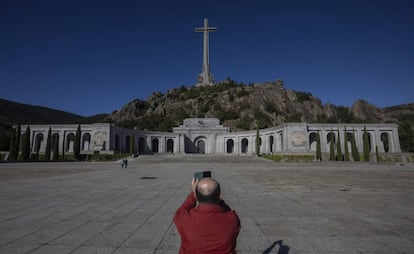Supreme Court authorizes immediate exhumation of Francisco Franco
A ruling made public today removes the final obstacles in the way of the transfer of the former Spanish dictator’s remains, and rejects appeals filed by his grandchildren

Spain’s Supreme Court has today given its final green light to the exhumation of Francisco Franco from the Valley of the Fallen monument, located around 50 kilometers west of Madrid. The sentence that was made public on Monday by the top court rules that the plan by the Socialist Party (PSOE) government of caretaker Prime Minister Pedro Sánchez to move the former dictator to another cemetery is constitutional, and does not infringe planning laws or local legislation.
Sánchez announced the plan to exhume Franco from the controversial monument shortly after coming to power in June 2018. The presence of the dictator of Spain in a site such as the Valley of the Fallen – which was built to honor the dead from Spain’s Civil War (1936-39) – has long been an uncomfortable reality for many Spaniards, while there are also those who believe that he should be left where he is.
The exhumation has been beset from the start by legal challenges and appeals
The exhumation has been beset from the start by legal challenges and appeals, not least from Franco’s grandchildren, who have been bitterly opposed to the plan. The family of the dictator managed to throw a spanner in the works for the PSOE government when it demanded that he be re-interred in the crypt of La Almudena cathedral, a tourist attraction that is located in central Madrid.
What’s more, in February an administrative judge suspended the building license to begin the work to remove the remains from the basilica at the Valley of the Fallen. Judge José Yusty took the decision based on a report that had been commissioned by the Francisco Franco Foundation that concluded that the project was a danger to the “safety of persons and assets.”
But today’s ruling from the Supreme Court has removed all of these obstacles, finding that it is the Spanish Cabinet that must arrange for the work to move the remains and as such a municipal license is not necessary. The court also failed to find any irregularities in terms of legislation covering funerary health standards, and it considers the royal decree passed by the government to pave the way for the exhumation to be constitutional.
Valley of the Fallen
The 13.6-square kilometer Valley of the Fallen site remains hotly contested in a country still struggling to come to terms with the legacy of the fascist dictatorship of Franco, who was the Spanish head of state from the end of the Civil War in 1939 to his death in 1975.
The site was ostensibly built to commemorate all of the victims on both sides of Spain's bitter and bloody Civil War (1936-1939), and the unmarked remains of more than 33,000 victims of the conflict lie there. But critics point out that the Valley of the Fallen, which features a basilica and a 150-meter-high cross that dominates the surrounding countryside, contains just two marked graves: those of Franco himself and José Antonio Primo de Rivera, the founder of the Falange, Spain's fascist-inspired political party. At the same time, thousands of prisoners of war who fought against Franco in the civil conflict were among the workforce used in its construction.
The Supreme Court also backed the government’s opposition to the remains being moved to the crypt at the Almudena cathedral, not just for security reasons, but also given the “significance of Francisco Franco Bahamonde” in Spain’s recent history. The court also verified that the government had opted to move the former dictator to the El Pardo cemetery, in the north of the Madrid region, after Franco’s grandchildren failed to choose an alternative site.
The Supreme Court announced last Tuesday that it was approving Pedro Sánchez’s government’s plan to exhume Franco from the Valley of the Fallen and take him to the El Pardo cemetery in Mingorrubio, but until today it had not made the arguments upon which the ruling is based public.
The caretaker PSOE government wants to exhume the body before the campaign ahead of the November 10 general elections begins, but it has been waiting to hear the full content of the ruling before proceeding.
The court has also completely rejected the appeal filed by the Franco family, which opposed both the exhumation and the dictator’s reburial in El Pardo, where his wife, Carmen Polo, was laid to rest. The family has announced that it will file an appeal with Spain’s Constitutional Court on grounds of the violation of fundamental rights, which could still delay Sánchez’s plans.
For now, the government has in its favor the fact that the court found that “general interest” should take precedence over the rights of the family to bury Franco in the crypt at La Almudena cathedral. The ruling from the Supreme Court was unanimous, with all six judges who considered the case in agreement.
English version by Simon Hunter.
Tu suscripción se está usando en otro dispositivo
¿Quieres añadir otro usuario a tu suscripción?
Si continúas leyendo en este dispositivo, no se podrá leer en el otro.
FlechaTu suscripción se está usando en otro dispositivo y solo puedes acceder a EL PAÍS desde un dispositivo a la vez.
Si quieres compartir tu cuenta, cambia tu suscripción a la modalidad Premium, así podrás añadir otro usuario. Cada uno accederá con su propia cuenta de email, lo que os permitirá personalizar vuestra experiencia en EL PAÍS.
¿Tienes una suscripción de empresa? Accede aquí para contratar más cuentas.
En el caso de no saber quién está usando tu cuenta, te recomendamos cambiar tu contraseña aquí.
Si decides continuar compartiendo tu cuenta, este mensaje se mostrará en tu dispositivo y en el de la otra persona que está usando tu cuenta de forma indefinida, afectando a tu experiencia de lectura. Puedes consultar aquí los términos y condiciones de la suscripción digital.









































